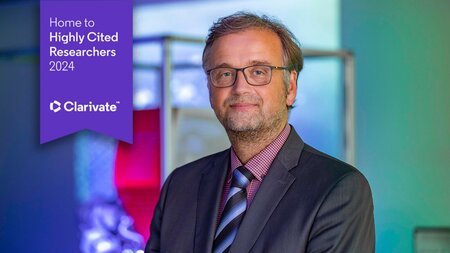Observing the Brain at Work
Eleven Questions for Prof. Dr. Alexandra Bendixen, who has held the Professorship of Structure and Function of Cognitive Systems since April 2015
-

Prof. Dr. Alexandra Bendixen prepares to take an electroencephalography (EEG) measurement in the laboratory. Photo: Martin Reiche
Prof. Dr. Alexandra Bendixen (36) has held the Professorship of Structure and Function of Cognitive Systems since April 2015. In eleven answers, she gives “University News” readers a glimpse into her background, her goals and her time in Chemnitz.
What does it mean to specialize in the structure and function of cognitive systems?
My research group and I are conducting research to determine which principles govern human mental processes. Our most important research tool, electroencephaolography (EEG), allows us to “observe the brain at work” - recording sensory and cognitive processes in the human brain as they are actually occurring. In this way, we can gain an understanding of which higher cognitive functions (such as attention, memory, prediction) support us in performing our basic everyday activities which we carry out seemingly effortlessly (like understanding language).
The TU Chemnitz is the right choice for me as a professor, because ...
... it boldly pursues new directions. Here, interdisciplinarity isn’t just printed on the label, it is actually practiced. The university is also a good choice for me, because I feel a personal connection to the region.
Can you tell us a bit about your academic career so far?
I studied Psychology with a minor in Computer Science in Leipzig and Grenoble (France). After working at occupational psychological institutes in Stuttgart and Munich, I decided to pursue a doctorate in neuroscience in Leipzig. My postdoc research fellowship at the Hungarian Academy of Sciences in Budapest gave me a new perspective on cognitive science, which led to my habilitation at the Universität Leipzig. Beginning in 2013, I was a Junior Professor of Psychophysiology of Hearing at the Carl von Ossietzky University of Oldenburg and put together my own working group. I am really pleased that many of my group members are now researching and teaching with me in Chemnitz.
Describe your years of study in only a few words.
The inspiration that I received from the people around me was even more important than my professional influences.
Did you have role models during your studies who encouraged you to pursue a scientific career?
During my Diplom and Doctoral degree programs, I was fortunate to work with scientists who found it completely natural to have an exchange on equal footing. Being taken seriously in discussions about research from the very beginning significantly contributed to my perception of myself as a scientist. Therefore, it is very important to me that I also interact with my students and doctoral candidates as equals.
Do you have any advice for young students and graduates?
In my opinion, it is really important to choose thosee one development opportunitiesy that is are right for you from all of the many possibilities, to find out what you are truly interested in and then resolutely pursue it, challenge yourself along the way and don’t take the path of least resistance. I know from experience how important it is to actively try out alternatives – but then to also have the courage to change direction when you realize that it isn’t the right path for you.
What would you like to achieve in with your teachings in the future?
I hope to arouse and sustain enthusiasm for the modern, interdisciplinary field of “Sensory and Cognitive Psychology”, to reach a deep and genuine understanding of the content we teach, to help establish a critical, scientific approach as the norm, to promote students’ individual responsibility and have discussions with them as equals.
What impact does your research have at the TU Chemnitz?
With the installation of the state-of-the-art psychophysics and EEG laboratories, my team and I now have the opportunity to work with my team to research study the interplay between human senses and cognition and how they change across the lifespan. At the moment, we are concentratedfocus on auditory research, because the topic of “Hearing in Old Age” is rapidly gaining significance in society. Another of our central research topics is attention allocation and resource prioritization in situations with a high number of stimuli and demands. Analysis of human sensory systems and cognition provides a solid basis for their replication in technical systems and therefore reinforces the TU Chemnitz’s key research emphasis in “Humans and Technology”. In the future, we hope to combine the research activities of all of relevant working groups at the TU Chemnitz in the Center for Sensingors and Cognitive Psychologyon so we can further promote interdisciplinary exchange.
There are around 45,000 professors at German universities. What distinguishes you from all others?
As a psychologist at an Institute of Physics, I have certainly taken an unusual path to my professorship – but the underlying idea, testing the boundaries of what has been established, hopefully unites me with my colleagues.
What is your favorite place to show guests in Chemnitz?
Along with the sights in the city center, Villa Esche is always on the program.
How do you play a part in the life of the city?
Since arriving in the city, apart from my academic work, life has mostly been focused on my now 18-month-old son. In the future, I also look forward to contributing musically to the life of the city.
More information about the Professorship: https://www.tu-chemnitz.de/physik/SFKS/index.html.en
Mario Steinebach
15.08.2016





